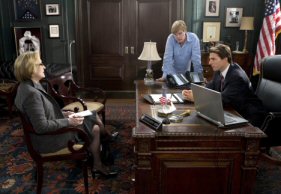|
Lions
For Lambs
You've got to stand for something or you'll
fall for anything. Thank you, Mr. Redford, for that country-western
sentiment. Personally, when attending a drama, I stand for
narrative that allows me to extract the meaning, rather
than fall for a lecture with the barest illusion of a plot.
In Lions For Lambs, Robert Redford
stars and directs an earnest, preachy diatribe that seems
pretty reasonable. You might agree with its politics. Heck,
I agree with its politics, but it might as well have
been Lullabyes For Lame-Os. For one brief moment,
you could hope that this was going someplace, but no, Redford
would rather just pound us over the head with his message.
Divided into three different yet miraculously
interconnected stories, the script twists and writhes in
order to make them all happen in real time. That real time
would be just under an hour and a half, but you'll swear
it was at least three.
Meryl Streep stars as a Washington reporter
getting exclusive access to Senator Jasper Irving (Tom Cruise).
On the West Coast at a nameless California University, Professor
Malley (Redford) conferences with a disappointing student,
Todd Hayes (Andrew Garfield). It seems Hayes reminds Malley
of two other students with great potential that he once
taught, who eschewed graduate school for the military.
By sheer coincidence, those two happen
to be involved in a troop surge in Afghanistan, failing
in their mission at the very same time that Irving explains
the rationale for it to Streep's reporter. As Cruise talks
to Streep and Redford talks to Garfield, what do these two
soldiers in the middle of combat do?
Talk. Then stand.
Matthew Michael Carnahan's screenplay at
least tries to be reasonable in its ideas. Certainly in
our current political situation, we have a lot of fingers
to point without getting much satisfaction. Cruise's Senator
says as much - admit to the mistakes and try to move forward.
On the surface, this isn't an attack so much as a plea for
our country to regain its honor, for the youth to get involved
and care, regardless of which side of the political spectrum
they fall. It's noble.
But the screenplay also cheats, creating
scenes of ridiculously false theatricality. Aside from the
triple coincidence of its narrative, which stretches believability,
Carnahan builds moment after moment in which people take
the most theatrical way of demonstrating their points. I
was especially fond of Streep challenging her editor, played
by Kevin Dunn, with the classic "we used to be about
something" speech.
Carnahan
overplays his reality. It isn't enough for Cruise to be
a powerful Senator; he's the guy dubbed "…the future of
his party" back in 2002, a relatively young (45) dynamic
politician in the Republican Party, when we know that neither
party has anybody with half the charisma of Cruise. In a
criticism of journalism, he also references a bubble-headed
news anchor with a multitude of ethnic names. Not only does
it sound fake, the character comments on how fake it sounds.
That kind of adds up to fake.
In casting, too, the film skews things.
As charismatic as Cruise may be, he's developed a persona
of untrustworthiness. (He produced the film, so that casting
error may be accidental based on his own blindness.) No
matter how reasonable his arguments, we have to take them
with a grain of salt. Then again, who has the gall to say
Redford doesn't know what he's talking about?
Certainly no one involved with this film,
though occasional nay-saying might have helped. Redford
may be a skilled "actor's director," but he can't handle
action; the Afghanistan scenes might make you long for the
glory days of Cannon Films, they're so cheap and lifeless.
Yet a few things do hit home. College students
today really do feel pretty powerless, though it would be
nice to be given more encouragement than a vague, "at least
do something." The fact that Streep looks out her
car window to see obviously worn stock footage of the White
House also speaks volumes about the precariousness of our
times. It's preaching to the choir,
though. In fact, at the press screening I attended, half
the audience thought they were getting to see P2,
a pretty far cry from Lions For Lambs, and many walked
out early. As I walked out into the AMC lobby (after watching
the whole film), a plasma HD screen played a National Guard
recruitment video by 3 Doors Down.
Somehow, that summed up my problems with
the film. Even though it was about young people getting
involved, it didn't want to get involved with young people.
|







